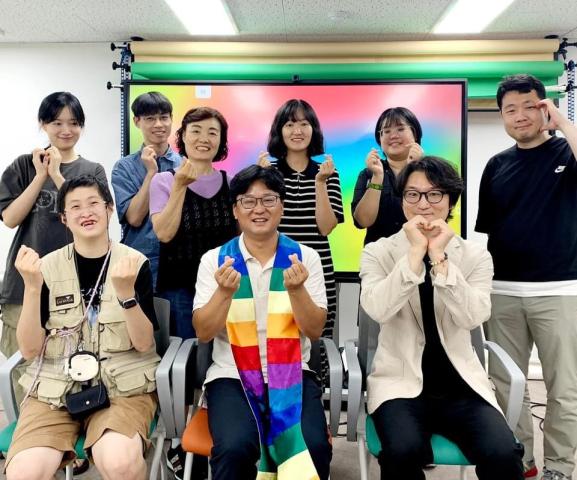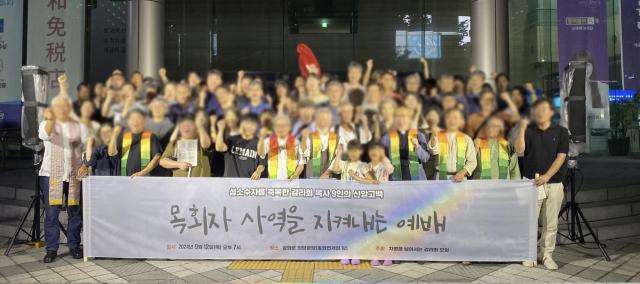The United Church of Canada’s support for a pastor in the struggle for LGBTQIA+ inclusion in the Korean church had a profound impact.

Recently, a photograph brought tears to my eyes. It was taken at a worship service on September 12 of this year, held in support of Korean Methodist pastors who performed a blessing ceremony at the 2024 Queer Festival in South Korea. The image had been blurred to obscure the faces of the attendees, a precaution since the Korean Methodist Church, which recently excommunicated a pastor for welcoming LGBTQIA+ individuals, is on the hunt for more targets.
The story began in August 2019 at a queer festival when Rev. Dong-Hwan Lee of the Korean Methodist Church held a blessing for LGBTQ+ participants. The church claimed that his actions violated a rule enacted in 2016, which states that anyone who supports or endorses homosexuality would be subject to suspension, defrocking, or excommunication. In 2020, Rev. Lee was suspended for two years.
Shortly after his suspension ended, the church put him on trial again for continuing to minister to the LGBTQ+ community. After appeals through the church’s judicial system, Rev. Lee was ultimately excommunicated in 2024.
Rev. Dong-Hwan Lee was suspended, and ultimately excommunicated in 2024, for his support of LGBTQAI+ inclusion in the Korean Methodist Church.
His excommunication however stirred the hearts of other pastors within the church. Hundreds of clergy voiced their opposition to the decision. At the Seoul Queer Festival on June 1, 2024, six Korean Methodist pastors stood alongside Rev. Lee, performing a blessing ceremony for LGBTQ+ individuals. They offered prayers of God’s unconditional love to those marginalized because of their gender identity or sexual orientation. The church has since filed charges against all of them.

This summer, I visited South Korea during my holiday and had the honor of serving as guest preacher at a worship service at Glory First Church, where Rev. Lee ministers. Contrary to my expectations, both Rev. Lee and his congregation remained filled with hope. In fact, it was I who left the service feeling more empowered and encouraged than when I arrived.
After the service, I joined the congregation for a meal. Rev. Lee and I were classmates at Korean Methodist Theological University in Seoul, so I have long been aware of his deep and sincere faith, as well as his dedication and unwavering commitment to serving the vulnerable and oppressed in South Korea, following the path of Jesus.
Contrary to my expectations, both Rev. Lee and his congregation remained filled with hope.
During our conversation, Rev. Lee expressed gratitude for the support he received from The United Church of Canada during his first trial in 2020. At the time, I was pursuing my M.Div. at St. Andrew’s College in Saskatoon, SK, and shared his story with members of Grosvenor Park United Church, where I was attending. Shortly after, the congregation, deeply committed to the Affirming Ministry, sent an open letter of support to Rev. Lee. The letter, recorded on video and read by the congregation’s minister, Rev. Nobuko Iwai, was translated into Korean by me. Rev. Lee later responded with a video message of thanks. This act of solidarity encouraged other groups, including St. Andrew’s College and various Regional Councils, to send letters of support as well. Eventually, Rev. Michael Blair, the General Secretary of The United Church of Canada, sent an official letter of support on behalf of the denomination.
Grosvenor Park United Church, St. Andrew’s College, various Regional Councils, and General Secretary Rev. Michael Blair sent support on behalf of The United Church of Canada.
In 2020, as Rev. Lee faced feelings of despair and powerlessness during his trial, he shared that the public support from The United Church gave him great comfort and strength. During a time when he was battling from insomnia, panic disorder, and social anxiety, the prayers and solidarity from across the globe renewed his hope. The support from The United Church of Canada served as a vital lifeline that encouraged him to continue his work of sharing Christ’s love with the marginalized. Notably, The United Church of Canada was the only denomination to officially support him during this period.
Since his excommunication, several theological schools in the United States have offered Rev. Lee scholarships, including substantial financial support, to continue his studies. However, he chose to remain in South Korea, unwilling to give up on the Korean church. He continues to work for the LGBTQ+ Christian organization he founded, Q&A, where he conducts theological research, leads worship services, and develops liturgical resources for LGBTQ+ individuals. Yet, financial challenges persist, as churches and organizations are hesitant to support Q&A for fear of being stigmatized by their denominations.
Before I left Korea, I met Rev. Heung-Do Cha, one of the pastors who stood alongside Rev. Lee at the Queer Festival in 2024. Rev. Cha, whom I had worked with at the Methodist Rural Mission Training Institute before moving to Canada, is nearing retirement. He explained that his motivation for participating in the blessing ceremony stemmed from a deep sense of responsibility toward younger clergy and a desire to see the Korean church move forward. The pastors who participated in the blessing were all approaching retirement and had discouraged younger pastors from taking part because they could not bear to see more devout ministers like Rev. Lee exiled from the church.
These pastors, who have long spoken prophetically against dictatorship and corruption in South Korea, represent a proud legacy of ministry. Yet, once again, the Korean Methodist Church is preparing to expel cherished pastors. However, one thing remains certain: no church can expel God’s love for the marginalized and oppressed from the world.
—Rev. Min Hwang, is the minister at South Stormont Pastoral Charge in the Eastern Ontario Outaouais Regional Council.
Addendum: Rev. Dong-Hwan Lee took his case to the civil courts with the help of human rights lawyers who worked pro bono. He has won the case. The Korean Methodist Church, however, has appealed the decision. Watch for a follow up blog post about this situation.
You may also be interested in “Where is God?”
The views contained within these blogs are personal and do not necessarily reflect those of The United Church of Canada.